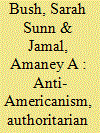|
|
|
Sort Order |
|
|
|
Items / Page
|
|
|
|
|
|
|
| Srl | Item |
| 1 |
ID:
138297


|
|
|
|
|
| Summary/Abstract |
A pillar of American foreign policy in the Middle East since September 11, 2001, has been promoting democracy, with particular emphasis on support for women's representation. Given high levels of anti-Americanism in the region, does foreign pressure for policy reform undermine this project? Evidence from a nationally representative survey experiment in Jordan shows that an American endorsement of women in politics has no average effect on popular support for women's representation. Instead, domestic patterns of support and opposition to autocrats determine citizens' receptivity to policy endorsements, with policy endorsements of foreign-supported reforms polarizing public opinion. Both foreign and domestic endorsements of women in politics depress support among Jordanians who oppose their regime significantly more than among Jordanians who support it.
|
|
|
|
|
|
|
|
|
|
|
|
|
|
|
|
| 2 |
ID:
170030


|
|
|
|
|
| Summary/Abstract |
It is now commonplace for scholars to note that the number of international nongovernmental organizations (INGOs) has exploded. But, in recent years, the growth rate of INGOs globally and in the United States has stagnated. We argue this stagnation can best be explained by changes in the environment in which INGOs work. Specifically, the now dense population environment discourages new INGOs from being founded, while also encouraging competition. Analysis of a new, comprehensive dataset on American INGOs between 1992 and 2012 supports the argument, as do case studies of trends within the environmental conservation and democracy assistance sectors. The analysis suggests that debates about INGO cooperation and competition overlook a key environmental factor that varies across and within populations of organizations: density. We draw out the implications of this approach for contemporary global governance.
|
|
|
|
|
|
|
|
|
|
|
|
|
|
|
|
| 3 |
ID:
193655


|
|
|
|
|
| Summary/Abstract |
Gender differences in concern about climate change are highly correlated with economic development: when countries are wealthier, a gap emerges whereby women are more likely than men to express concern about our changing climate. These differences stem from cross-national variation in men’s attitudes. Men, more than women, tend to be less concerned about climate change when countries are wealthier. This article develops a new theory about the perceived costs and benefits of climate mitigation policy to explain this pattern. At the country level, the perceived benefits of mitigation tend to decrease with economic development, whereas the perceived costs increase. At the individual level, the perceived costs of mitigation tend to increase with economic development for men more than for women. Evidence from existing surveys from every world region, an original 10-country survey in the Americas and Europe, and focus groups in Peru and the United States support the theory.
|
|
|
|
|
|
|
|
|
|
|
|
|
|
|
|
| 4 |
ID:
172834


|
|
|
|
|
| Summary/Abstract |
What explains variation in individual preferences for foreign economic engagement? Although a large and growing literature addresses that question, little research examines how partner countries affect public opinion on policies such as trade, foreign aid, and investment. We construct a new theory arguing that political side-taking by outside powers shapes individuals’ support for engaging economically with those countries. We test the theory using original surveys in the United States and Tunisia. In both cases, the potential partner country's side-taking in the partisan politics of the respondents’ country dramatically shapes support for foreign economic relations. As the rise of new aid donors, investors, and trade partners creates new choices in economic partners, our theory and findings are critical to understanding mass preferences about open economic engagement.
|
|
|
|
|
|
|
|
|
|
|
|
|
|
|
|
| 5 |
ID:
102541


|
|
|
|
|
| Publication |
2011.
|
| Summary/Abstract |
Quotas to promote women's representation in the world's legislatures have spread to more than one hundred countries. The diffusion of gender quotas poses a puzzle since they have often been adopted in countries where women have low status. International influence and inducements best explain quota adoption in developing countries. Promoting gender equality, including through gender quotas, has become a key part of international democracy promotion. The international legitimacy of gender quotas leads them to be adopted through two causal pathways: directly, through postconflict peace operations, and indirectly, by encouraging countries, especially those that depend on foreign aid, to signal their commitment to democracy by adopting quotas. An event history analysis, which controls for other relevant factors, shows that the hypothesized relationships exist. Further support comes from a process-tracing analysis of Afghanistan's 2004 quota.
|
|
|
|
|
|
|
|
|
|
|
|
|
|
|
|
| 6 |
ID:
167668


|
|
|
|
|
| Summary/Abstract |
As noted by other contributions to this special issue, an American perspective shapes many leading quantitative datasets used by international relations scholars. This tendency can lead to biased inferences, but it can also enhance scholarly accuracy under certain conditions. Precisely because some datasets reflect national perspectives, they are appropriate to use when seeking to test theories in which the actors of interest subscribe to the same national perspective. This argument is illustrated with the case of US democracy assistance. Using an appropriate measure of democracy reveals that—contrary to some claims in the literature—US policy-makers allocate democracy assistance in ways that reflect their perceptions of countries’ regime types, giving less democracy assistance to countries that they perceive as more democratic.
|
|
|
|
|
|
|
|
|
|
|
|
|
|
|
|
| 7 |
ID:
154914


|
|
|
|
|
| Summary/Abstract |
The Freedom in the World (FITW) ratings of countries’ freedom, created by Freedom House in 1972, are widely used by many U.S. audiences, including journalists, policymakers, and scholars. Why and how did these ratings acquire private authority in the United States? Furthermore, why and to what extent have they retained private authority over time and across different audiences? Contrary to previous research on private authority, which emphasizes the role of raters’ expertise and independence, I advance an argument that emphasizes the role of ideological affinity between raters and users. Specifically, I argue that ratings are more likely to have authority among actors that share raters’ ideas about concept definition and coding. I also argue that ratings are more likely to have authority among weak actors that depend on powerful other users of the ratings. Diverse evidence and methods—including data on the ratings’ usage, an internal archive of Freedom House records, interviews with key informants, and a statistical analysis of bias—support the argument.
|
|
|
|
|
|
|
|
|
|
|
|
|
|
|
|
| 8 |
ID:
153945


|
|
|
| 9 |
ID:
160513


|
|
|
|
|
| Summary/Abstract |
Prior research has sought to understand the rise of election observers and their consequences for outcomes such as fraud, protest, and violence. These studies are important but they overlook a significant individual-level dynamic that observers themselves care about: the effect that election observers have on local attitudes about elections. We argue that the activities of election observers can enhance elections' local credibility, but only when locals perceive observers as being both capable of detecting fraud and unbiased in that pursuit. Not all observer groups are seen as equally capable and unbiased. Evidence from a large-scale, nationally representative experiment in Tunisia supports the argument. A key finding is that observers from the Arab League—an organization criticized internationally for low-quality election observation—enhanced credibility the most because they were perceived locally as both relatively capable and unbiased.
|
|
|
|
|
|
|
|
|
|
|
|
|
|
|
|
|
|
|
|
|